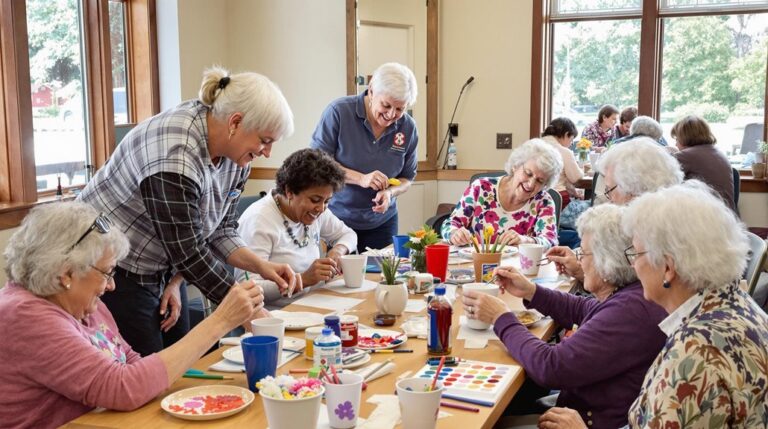Senior centers serve as essential community anchors where adults in their golden years discover purpose, friendship, and ongoing vitality. These welcoming spaces offer diverse programming that spans from gentle yoga sessions to engaging art workshops, providing opportunities for physical activity and creative expression. While many view these centers merely as gathering spots, they actually function as extensive wellness hubs that foster mental stimulation, emotional support, and meaningful social connections.
Key Takeaways
- Senior centers offer diverse activities like fitness classes, art workshops, and social groups to keep adults mentally and physically active.
- Use the Eldercare Locator service to find nearby senior centers and evaluate their programs based on your interests.
- Transportation options, including volunteer drivers and dial-a-ride services, help seniors access center activities regularly.
- Centers combat loneliness through structured social activities, group programs, and opportunities to meet others with similar interests.
- Over 11,000 nationwide centers provide health screenings, wellness workshops, and social connection opportunities under one roof.
What Makes Senior Centers Essential Community Hubs
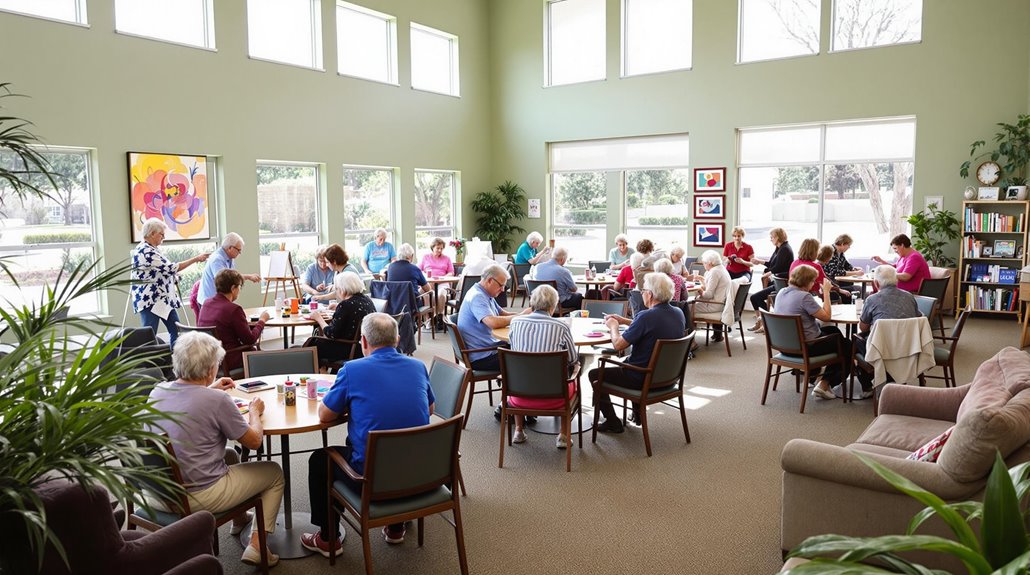
The significance of senior centers as fundamental community hubs extends far beyond their basic function as gathering spaces. These crucial institutions serve over one million older adults daily through extensive health services, resource sharing, and meaningful community involvement.
Senior centers enrich communities by offering vital health services and resources while fostering meaningful connections among older adults.
With more than 11,000 centers nationwide, they effectively combat social isolation and improve quality of life for seniors.
Through strategic partnerships with healthcare providers and local organizations, senior centers facilitate critical services including chronic disease management workshops, Medicare counseling, and health screenings.
Their impact is particularly remarkable in addressing the 42% of seniors who experience loneliness, creating environments that foster belonging and connection.
Popular Activities and Programs That Keep Seniors Engaged
Modern senior centers offer an expansive array of engaging activities and programs designed to enrich the lives of older adults while promoting physical health, mental stimulation, and social connection.
Popular fitness classes range from yoga and tai chi to aquatics and walking clubs, helping participants maintain mobility and manage chronic conditions.
Creative workshops in arts, crafts, and music provide opportunities for self-expression and skill development, while book clubs and technology courses foster continuous learning.
Centers also facilitate social engagement through game groups, volunteer initiatives, and intergenerational activities.
Many locations have adapted to changing needs by incorporating hybrid programming, offering both in-person and virtual options for fitness classes and educational sessions, ensuring accessibility for all members of the senior community.
Health Benefits of Regular Senior Center Participation
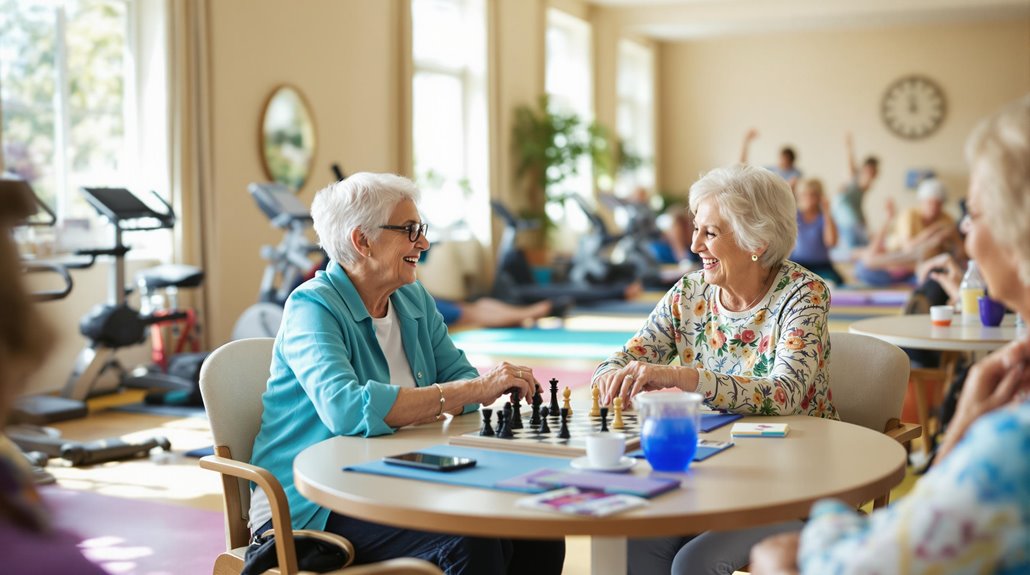
Regular participation in senior center activities yields numerous scientifically-documented health benefits that span physical, mental, and social dimensions of wellness. Studies show participants experience improved health metrics through structured exercise programs and wellness workshops, typically engaging 1-3 times weekly for over three hours per visit. These activities help manage chronic conditions while promoting disease prevention.
Beyond physical health, centers provide essential emotional support through peer interactions and group activities. Members report increased life satisfaction, reduced stress levels, and enhanced coping skills developed through educational programming.
The combination of regular social engagement and structured health initiatives creates a thorough approach to wellness, addressing both immediate health needs and long-term well-being through evidence-based programs specifically designed for older adults.
Making New Friends: Social Connection Opportunities
While making new friends can become more challenging with age, senior centers provide invaluable opportunities for meaningful social connections through structured activities and informal gatherings.
Understanding modern friendship dynamics, these centers offer diverse programming that naturally facilitates social interaction, from book clubs and art workshops to volunteer initiatives and cultural outings. Group activities help develop social skills while pursuing shared interests, making it easier to form lasting bonds.
For those facing health challenges that may impact their ability to connect, senior centers bridge gaps through accessible programming and transportation services.
With 75% of older adults expressing interest in expanding their social circles, centers create welcoming environments where members can engage in purpose-driven activities while building supportive relationships that often extend beyond scheduled programming.
Finding the Right Senior Center Near You
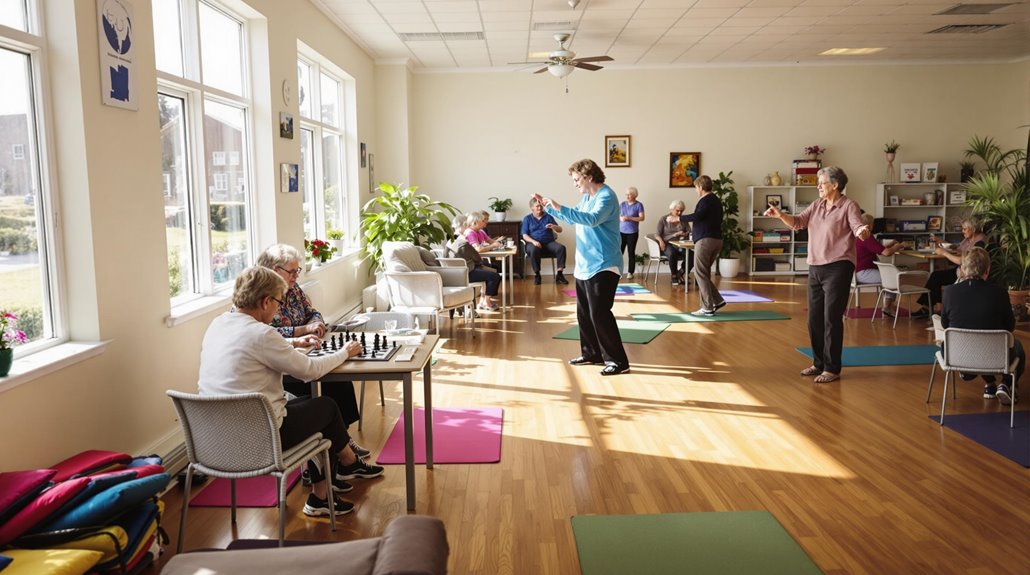
Discovering the ideal senior center begins with understanding local options and available resources within one’s community. For Siskiyou County residents, the Yreka Community Center serves as a central hub for senior services through Madrone Hospice, offering essential programs like meals, transportation, and social activities.
Location accessibility plays a significant role in selecting the right center, with urban facilities typically providing convenient access to community resources. The Eldercare Locator connects seniors to nearby services, while county Social Services offices assist with eligibility determinations.
HICAP provides Medicare counseling and insurance guidance, ensuring seniors receive necessary healthcare support. When evaluating centers, consider factors such as available activities, transportation options, and meal programs that align with individual needs and interests.
Cost-Effective Benefits and Financial Assistance Options
Seniors seeking financial stability can access numerous cost-effective benefits and assistance programs through various government and community organizations. Programs like Supplemental Security Income (SSI) and Medicaid provide essential financial and healthcare support, while benefit eligibility varies based on income levels and individual circumstances.
Through financial literacy workshops at Texas HHS Service Offices, seniors learn to navigate available resources effectively.
Local assistance extends to housing support through HUD programs and USDA Housing Repair Grants, helping seniors maintain safe, comfortable homes. The Low-Income Home Energy Assistance Program (LIHEAP) assists with utility costs, while programs like iCanConnect provide necessary assistive technology.
Seniors can explore these opportunities by connecting with Eldercare Locator services, which offer guidance on maximizing available benefits while maintaining financial independence.
Weekly Programs and Special Events Calendar Guide
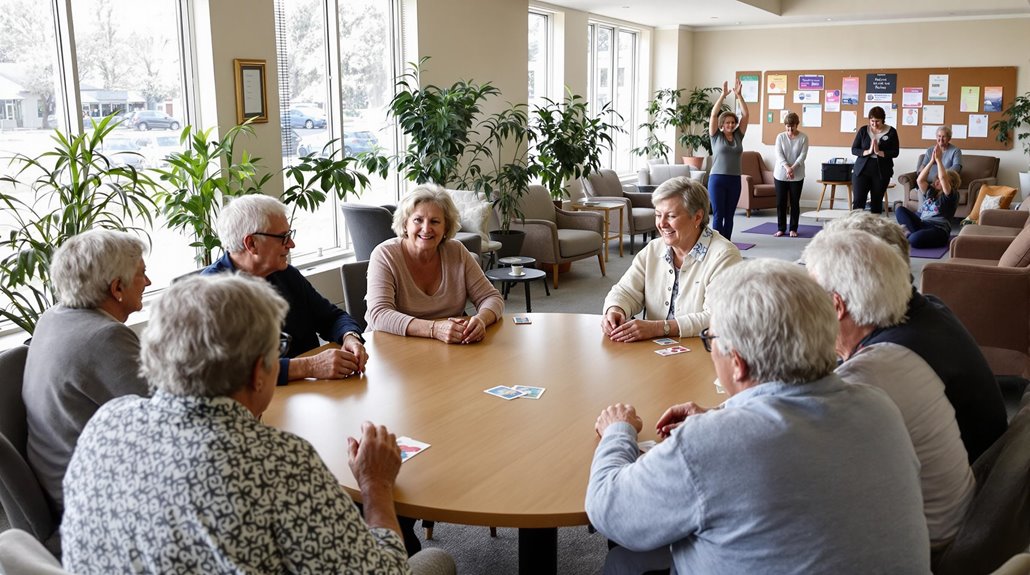
Active senior centers across the region consistently offer diverse weekly programs and special events that enrich participants’ lives through social, educational, and physical activities.
Weekly schedules feature extensive programming designed to engage seniors physically and mentally, while event highlights showcase special occasions that bring the community together.
Key program offerings include:
- Daily walking clubs and guided fitness activities promoting physical wellness
- Educational workshops and monthly speaker series covering diverse topics
- Creative arts programs featuring seasonal crafts and storytelling sessions
- Social card games and table sports fostering community connections
- Spiritual gatherings including Bible study and hymn sing-alongs
These structured activities provide seniors with regular opportunities to maintain active lifestyles, learn new skills, and build lasting friendships within their community.
Tips for Getting Started at Your Local Center
When starting on a journey to join a local senior center, thoughtful preparation and strategic planning can greatly enhance the experience.
Initial visits become more comfortable when accompanied by a friend, and many centers offer orientation sessions to explain available programs and membership benefits.
Successful engagement strategies include attending during peak hours to observe social dynamics, meeting with staff members who can recommend tailored activities, and exploring various programs that match personal interests and abilities.
Observing social dynamics during busy hours and seeking staff guidance helps newcomers find their perfect fit in senior center activities.
For ideal integration, new participants should evaluate the center’s accessibility features, review activity schedules, and consider starting with structured programs like fitness classes or shared dining experiences.
Many centers also facilitate peer mentorship programs, pairing newcomers with experienced members to guarantee a smooth change into the community.
Transportation Services and Accessibility Options
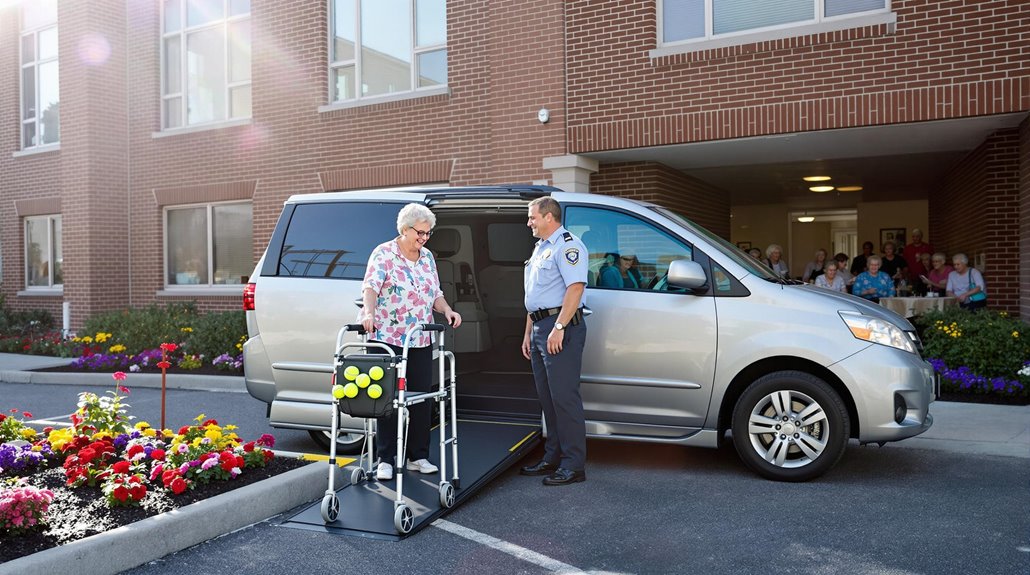
Getting to and from senior centers represents a significant consideration for community members seeking to maintain active, independent lifestyles. Various transportation options and service accessibility programs guarantee seniors can participate in center activities while maintaining their independence.
- Senior center and AAA transportation programs serve 79% of communities, offering reliable access to activities.
- Volunteer driver programs operate in 64% of service areas, providing personalized assistance.
- Dial-a-ride and demand response services accommodate 43% of older adults’ transportation needs.
- Fixed-route public transit remains available in areas receiving Section 5310 funding.
- Non-emergency medical transportation serves 73% of communities, guaranteeing access to healthcare.
Communities with federal funding demonstrate higher public transit availability, while transportation network companies like Uber and Lyft complement traditional services in 40% of surveyed areas.
These extensive options support aging in place, which 90% of seniors prefer.
Bottom Line
Senior centers remain crucial community resources that enrich the lives of older adults through diverse programming, social connections, and wellness activities. These welcoming spaces provide essential opportunities for seniors to maintain active lifestyles, develop meaningful friendships, and engage with their communities. Through affordable programs, accessible transportation options, and dedicated staff support, local senior centers continue fostering independence, health, and joy among aging populations across neighborhoods nationwide.

